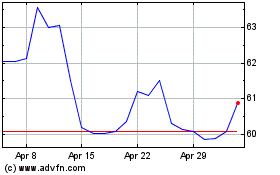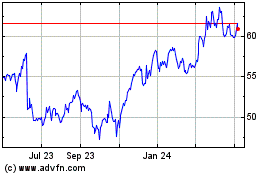Federal securities regulators are intensifying a broad
investigation into trading of pre-IPO shares, zeroing in on
companies that help technology-firm employees and others resell
their shares.
In a Nov. 25 court filing, the Securities and Exchange
Commission ordered an unregistered brokerage firm under
investigation, NetCirq LLC, to comply with an SEC subpoena sent on
April 7.
NetCirq, which says on its website that it "resells private
securities and portfolio interests creating a secondary market for
private equity," couldn't be reached for comment.
The filing, in a San Francisco federal court, says the SEC
broadly is investigating whether trading of pre-IPO shares could
violate securities laws under the Dodd-Frank Act because some of
the transactions could be considered "swaps," or agreements whose
value is tied to a future event.
The SEC filing is the first public confirmation by the agency of
the investigation. In July, The Wall Street Journal reported on the
initiation of the probe, which followed a Journal page-one article
in March that delved into the role of middlemen in the growing
market for private shares.
"The staff of the Commission is investigating whether certain
entities may have violated the federal securities laws in
connection with secondary-market trading of shares of growth-stage
private companies that have not yet conducted an initial public
offering (IPO)," according to the Nov. 25 filing.
The SEC filing added: "Certain entities may have, among other
things, improperly engaged in transactions that constitute
security-based swaps in violation of the federal securities
laws."
Many high-profile technology firms haven't gone public—including
smartphone-based car service Uber Technologies Inc.,
disappearing-message provider Snapchat Inc. and home-rental service
Airbnb Inc. That means nearly all their stock is owned by
venture-capital investors and employees, who face tight limits on
selling their shares.
But some early investors are eager to cash in now, particularly
amid signs of cracks in the tech boom. To help them outmaneuver
company restrictions on stock sales, middlemen are designing
derivatives that deliver payments to employees based on a stock's
perceived value. Some financial firms let employees pledge their
shares as collateral for a loan.
The SEC action comes as the value of private company shares have
soared.
More than 125 privately held, venture-capital-backed firms now
are worth at least $1 billion each, with a total valuation of more
than $310 billion. Just 49 companies were worth $1 billion or more
a year ago.
No one knows the exact size of the secondary market for shares
of private companies that are held by employees and other
investors. Participants in pre-IPO trading estimate that $10
billion to $30 billion in stock changed hands last year.
In the past year, a number of marketplaces have launched or
grown sharply that facilitate the sale of shares by employees in
private technology companies, including EquityZen Inc. and Equidate
Inc.
Some markets feature direct selling and buying of the shares,
but some companies, such as Uber, typically have blocked such
transfers by individual employees.
A handful of firms, such as San Francisco-based advisory firm
Scenic Advisement, work directly with companies to facilitate sales
of big blocks of employee, executive and founder shares. One such
firm, SecondMarket, which makes software to manage employee sales,
was acquired by Nasdaq Inc. in October.
In the SEC court papers, the agency contends that NetCirq has
failed to produce the documents it requested and that the company's
chief executive, Kristen McRedmond Wade, has "ignored" recent SEC
attempts to contact her. The filing is an application for a court
order enforcing its subpoena to NetCirq.
NetCirq isn't currently registered as a broker-dealer, the
filing says, "as would be required by law" if it was effecting
securities transactions.
Ms. Wade couldn't be reached for comment. The SEC didn't return
calls for comment.
In June, the SEC brought a cease-and-desist order against
Silicon Valley-based Sand Hill Exchange, which operated a website
designed to allow people to buy and sell contracts related to the
value of private companies and their securities.
In an administrative proceeding, the SEC said the company's
business allegedly violated the Dodd-Frank Act.
Sand Hill, which declined to comment, settled the charges
without admitting or denying the finding and agreed to pay a
$20,000 penalty.
The Dodd-Frank Act added new rules that many securities
derivatives must be traded on a national exchange and that many
sellers need to register as dealers of derivatives.
Write to Susan Pulliam at susan.pulliam@wsj.com and Telis Demos
at telis.demos@wsj.com
Subscribe to WSJ: http://online.wsj.com?mod=djnwires
(END) Dow Jones Newswires
December 01, 2015 22:55 ET (03:55 GMT)
Copyright (c) 2015 Dow Jones & Company, Inc.
Nasdaq (NASDAQ:NDAQ)
Historical Stock Chart
From Apr 2024 to May 2024

Nasdaq (NASDAQ:NDAQ)
Historical Stock Chart
From May 2023 to May 2024
